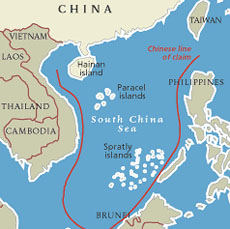Territorial Disputes in the South China Sea: What are the Risks of Conflict?

Practical information
This seminar is organized around Ralf Emmers, Associate Professor and Coordinator of the Multilateralism and Regionalism Programme, S. Rajaratnam School of International Studies (RSIS), Singapore. Among his latest publications are: Geopolitics and Maritime Territorial Disputes in East Asia, London: Routledge, 2009. (with Sam Bateman) (eds), Security and International Politics in the South China Sea: Towards a Co-operative Management Regime, London: Routledge, 2009.
Chair: Françoise Nicolas, Director, Center for Asian Studies Ifri.
The seminar will be held in English.
The presentation will focus on the changing distribution of power in the South China Sea and assess the implications this has for conflict management and avoidance in the disputed areas. There is a growing asymmetry of naval power in the South China Sea to the advantage of China. Southeast Asian claimants are concerned about the rapidly changing power distribution and fear that overwhelming naval capabilities could one day be used by the People's Republic of China to resolve the sovereignty question militarily. The presentation will therefore examine how the Southeast Asian nations have sought, with some success, to manage the unequal power distribution in the South China Sea through the activities of the Association of Southeast Asian Nations (ASEAN) and its model of conflict management and avoidance. It will assess the risks of conflict in the short to medium term and offer a way forward.
Speakers
Other events

Paris Naval Conference 2026: Naval Rearmament and Operations in Contested Waters
This fourth edition of the Paris Naval Conference (CNP), bringing together high-level military, industrial, and academic speakers, will address the challenges associated with general naval rearmament and naval operations in increasingly contested environments.





